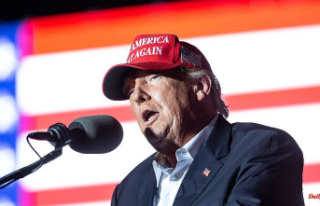The CSU leader is facing a fateful election in Bavaria. But a year in advance, no one in the party knows which issues will be on people's minds. So Söder is focusing on a topic at the party conference that he knows from the inside: himself.
He saw himself as a chancellor candidate of the heart or hugged trees as Prime Minister as a sign of his love for the environment - now Markus Söder has found a completely new role: He wants to be the strong shoulder that the whole country can lean on. In the midst of maximum uncertainty, he wanted to "give the population support and hope," said the CSU leader at the party conference in Augsburg.
This new role of Söder is a response by the CSU strategists to the general mood of crisis. But it is also the answer to the uncertainty that prevails in the CSU. A year before the state elections, nobody dares to predict which topics will move people in a year's time. Above all, no one in the CSU knows which election promises will even be financially viable.
Focusing on Söder as a personality, on the other hand, doesn't cost any money - and at the moment the Christian Socialists seem to be content with their chairman appearing as a one-man show in Bavaria and to the federal government. Söder tries to fill this role with vigor in his speech in front of the several hundred delegates. A year after the lost federal election, he sounds as if he is about to go to the next federal election and not as if he has to win a state election next year.
Söder criticized the traffic light coalition as "one of the weakest governments" of all time in the Federal Republic. He accuses the chancellor of isolating Germany in terms of foreign policy - Berlin behaves "extremely snooty and arrogant" in the world. Söder describes the green Federal Minister of Economics Robert Habeck as unsuitable for his office. And he demands that instead of paying money to Berliners and Bremen via the state financial equalization system, the money should stay in Bavaria.
The delegates always celebrate Söder with a lot of applause, at the end of his speech they jump up to standing applause. What goes down, however, is that apart from their one-man show Söder, the CSU currently has little on offer. This is evident at the start of the party congress. The pale CSU General Secretary Martin Huber and his staff organized the delegates' meeting in such a way that substantive issues were discussed in various forums before the Söder speech.
However, the whole thing seems like a farce. The forums take place in a hall where exhibitors also have their stands. And while only a few CSU members are really working on the topics in a concentrated manner, the far greater part is romping around at the stands of exhibitors such as Airbus or the Bavarian beet farmers - motto: "Beet farmers are sweet climate saviors" - and talking loudly. The stand of the slot machine manufacturers is particularly popular, where beer and white sausages are available for free.
At the moment, the content weakness does not seem to be a problem for the CSU. The fixation on Söder works, his personal poll numbers are consistently high. The question will be whether the Christian Socialists can maintain this support until the state elections in a year. Because outside of Bavaria, somewhat unnoticed, a kind of opposition coalition has formed in the Bavarian state parliament. The SPD, Greens and FDP set up two investigative committees last week with which they want to put the CSU and Söder under pressure in the coming months.
It is not foreseeable whether they will succeed - but the cooperation of the three coalition parties in Berlin alone annoys the CSU in Bavaria. Söder also seems to take the competition seriously. "We don't want 'traffic lights' in Bavaria," he exclaims. Of course, Söder gets applause for that. But after the course of the party congress, the CSU leader knows who has to prevent the three parties from becoming stronger - he alone.












